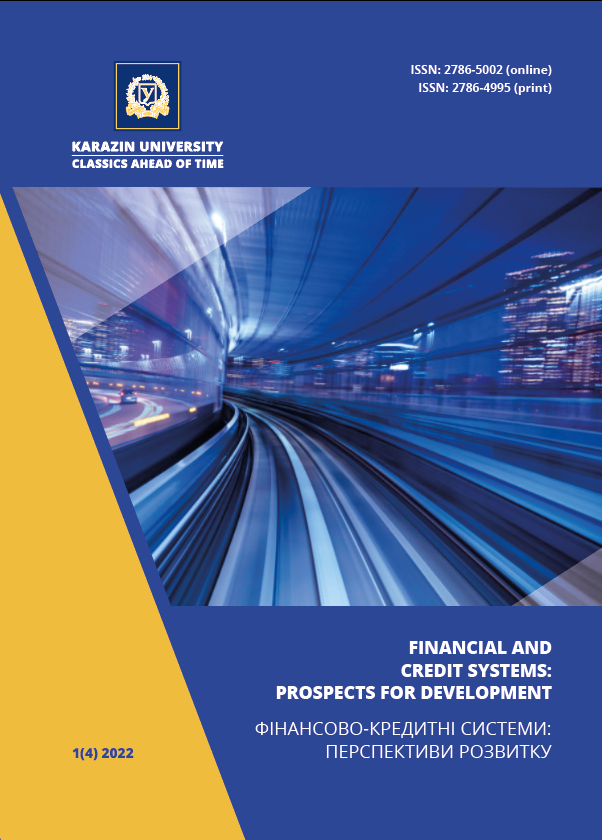INSTRUMENTAL PRINCIPLES OF INTELLECTUAL CAPITAL ANALYSIS OF SOCIO-ECONOMIC SYSTEMS
Abstract
The article offers the latest approaches to assessing the level of intellectual capital of socio-economic systems based on models and methods of assessing intellectual capital. Modern tools for modeling are applied, namely: methods of reducing information space to assess the overall level of intellectual capital of Ukraine; model of forecasting the level of intellectual capital of Ukraine using adaptive forecasting methods; system-dynamic modeling. Models of intellectual potential assessment are systematized and analyzed according to the following approaches: by analogy with the calculation of the index of human potential development; by functional structure or components of intellectual capital; according to the process approach, which involves determining the input parameters of intellectual capital, indicators that reflect the intellectual processes during the study, and output parameters that represent the final results; by a step-by-step approach based on a step-by-step assessment of intellectual capital.
The aim of the study is to develop a set of models for assessing and analyzing the intellectual capital of socio-economic systems at the macro level, in particular, at the state level, which will improve the quality of formation and management decisions in public relations. To achieve this goal, the article proposes and solves the following scientific tasks: a model for assessing the level of intellectual capital of Ukraine has been built; the model of forecasting of indicators of the intellectual capital of the state has been developed; a simulation model of intellectual capital management of Ukraine has been developed.
The results obtained from the set of models can be used in the formation and adoption of management decisions to improve the efficiency of intellectual capital of Ukraine and the development of strategies for safe development of human resources by state and regional governments.
Downloads
References
Veretennikova O., Krykun N. (2012). Method of assessing the intellectual potential of the region. Innovative economy. № 7. P. 131–140.
Guzenko G., Gaiduchenko Y. (2013). Intellectual potential as a basis for the formation of the knowledge economy. Collection of scientific works of Kharkiv National Pedagogical University named after G. Skovoroda. Economy. № 13. P. 84–97.
Doktorovich A. (2012). Methodology for analyzing the development of intellectual potential. Labor and social relations. № 1. P. 3–11.
Emelyanov A., Vlasova E., Duma R. (2002). Simulation of economic processes: textbook. allowance. M.: Finance and statistics. 368 p.
Karpov Yu. (2005). Simulation modeling of systems. Introduction to modeling with AnyLogic 5. S.Pb.: BHV – Petersburg. 400 p.
Marchenko O. (2012). Intellectual security in the dimension of the knowledge economy. Bulletin of the Y. Mudriy Law Academy of Ukraine. № 1 (8). P. 278–279.
Matusevich K. (2010). Intellectual potential as an institutional factor in the formation of post-industrial economy: author's ref. dis. for the degree of Cand. econ. Science: special. 08.01.01 "Economic theory and history of economic thought". Kiev, 24 p.
Moiseenko I. (2010). Management of intellectual potential of economic entities in the national economy: author. dis. for the degree of Dr. econ. Science: special. 08.00.03 "Economics and management of the national economy". Lviv. nat. Univ. of I. Franko. Lviv, 35 p.
Molina O. (2012). Intellectual potential of the region as a source and measure of its innovation. Problems of science. № 5. P. 9–14.
Radionova I., Usyk V. (2011). Intellectual capital and intellectual potential of the economy: delimitation of concepts and phenomena. Actual problems of economy. № 10 (124). P. 56–66.
Revak I. (2015). Functions of intellectual potential of the state. Problems of economy: new markets and new directions of development: materials of the International scientific-practical conference: (Dnepropetrovsk, February 6-7, 2015 p.). - Dnepropetrovsk: NGO "Perspective", part 1. P. 20-22.
Revak I. (2014). Methodical approaches to assessing the intellectual potential of the state. Scientific Bulletin of Kherson State University. Economic sciences series. Kherson. Issue 8/2014. P. 214–219.
Revak I. (2014). Structural components of the intellectual potential of the state. Visnyk of Chernihiv State Technological University. Economic Sciences Series. Chernihiv. Issue 3 (75). P. 52–62.

